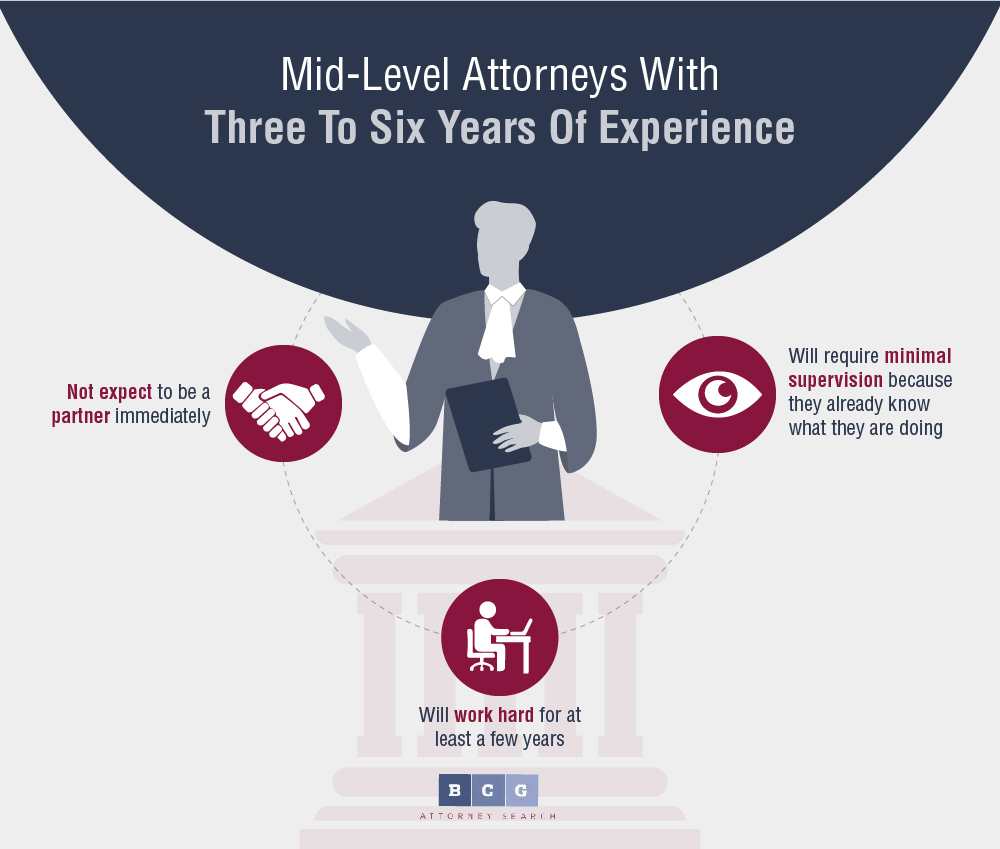Most of our placements with firms with openings are for candidates whose law firm experience level does not match what the firm is seeking in their job postings. We work with candidates at BCG Attorney Search who think we are making a mistake in sending them job postings that do not match their number of years of experience. We would be making a mistake not sending them these jobs. We send them these openings precisely because we know what we are doing.

Why do most law firms ask for one level of experience and often hire legal professionals who do not match that level of expertise?
Law Firms Hire Outside of Their Supposed Years of Experience Requirements Because They Hire for Business Reasons

Law firms only have openings and go to the trouble of making others aware of this when there is a business need. A business need means that they have: (1) work from a client that is not getting done; (2) the law firm is losing money not doing this work; and (3) the law firm risks losing the client (and partners that need attorneys hired to help them) without hiring.
Imagine you are a law firm and a real estate associate just left, who was billing 2,000 hours a year for the only real estate partner in your law firm. The partner would be up in arms and prefer a hardworking fifth year to help him immediately. His clients are up in arms because work is not getting done. The partner is complaining. The only applicants you have received with five years of experience are doing unsophisticated work and have bad attitudes. There does not seem to be anyone who fits the bill. In contrast, you have a few excellent candidates who match what you are seeking, but one only has two years of experience (at a similar law firm), and another has nine years of experience. What do you do?

Most law firms in this situation do not sit around waiting for the perfect applicant. Instead, they hire outside their class year requirements. They figure out a way to make an exception.
Generally, law firm openings for attorneys fall into buckets of experience levels. Law firms are likely to have flexibility within the bucket. You will be unlikely to be hired when you apply to a job description with an experience level outside of a certain bucket. However, if your experience level falls within the bucket for the job you are applying for, you can be hired even if you do not have the exact level of experience the firm is seeking.
BUCKET 1: Recent Law School Graduates With No Experience

Here, the law firm is prepared to train you and wants to indoctrinate you into its culture, clients, and ways of practicing law. Law firms that do this sort of hiring wish to bring in people who can do junior-level work and learn. If a law firm has one of these openings, it is likely not that flexible and wants a new associate.
BUCKET 2: Entry-Level Attorneys With Less Than One Year Of Experience
While rare, law firms hire people with minimal experience (less than a year). Law firms seeking lawyers with less than one year of experience are not likely to be too flexible. Law firms with these openings are likely to have lots of "grunt work" they cannot charge clients high billable hour rates for or may have an opening because someone in their associate class left.
BUCKET 3: Junior Attorney With One To Three Years Of Experience

The more experience an attorney has, the more likely they will know what they are doing and not have their hours written off by clients. An associate with one to three years of experience has some idea of what they are doing and has had at least minimal training and experience. They can be billed at low hourly rates compared to more senior attorneys, are likely quite hungry (to make partners, advance, get experience) and want to follow orders, have stamina, and are enthusiastic about practicing law. Law firms seeking people in this range are likely to favor people with two instead of one year of experience and three instead of two years of experience.
When law firms make exceptions for a class year for junior attorneys, the business purpose for a first to third-year associate is similar. Therefore, a law firm seeking two years of experience may be willing to hire someone with a singular year of experience or three years of experience. A law firm seeking attorneys in this range may be ready to hire someone with nine months of experience and not one year or four years of experience instead of three—however, the larger the law firm, the less likely they are to be flexible. They want young, hungry, enthusiastic attorneys at this level. If a law firm needs someone with no more than three years of experience and you have five years, they may ask you to step back in terms of your class year, for example.
BUCKET 4: Mid-Level Attorneys With Three To Six Years Of Experience
Here, attorneys are in the most marketable bucket. Attorneys at this level tend to know what they are doing, be reasonably efficient with their time, be hardworking and enthusiastic, are interested in improving, and are hungry for recognition and partnership. Attorneys with solid experience in a practice area in this range are the most marketable they will ever be as associates.
Law firms hiring mid-level attorneys are likely to have some flexibility (if they want a third year, they may employ a second year. If they wish a sixth year, they may hire a seventh year—or third year). A law firm that wants a mid-level attorney is most concerned with the fact that the attorney will: (1) not expect to be a partner immediately; (2) will work hard for at least a few years; and (3) will require minimal supervision because they already know what they are doing.
BUCKET 5: Senior (Associate Level) Attorneys With Six To Nine Years Of Experience
Law firms here want well-trained people in their practice area who can manage matters and clients and know what they are doing with minimal supervision. They want attorneys who are reasonably enthusiastic about the opportunity of becoming a partner in the firm.
Law firms make exceptions for senior (associate level) attorneys with six to nine years of experience. Law firms that have openings in this range will have some flexibility in the class year (a fourth- or fifth-year attorney may be hired instead of a sixth year), but not all that much. Here, the law firm is more concerned with getting committed and inspired work out of you. They want attorneys who can follow directions and are not jaded and disheartened about advancing to a partnership. They want you to believe advancement is possible. To complement this discussion on experience, this video explains how to decide the number of applications you should submit: How Many Firms and Jobs Should I Apply To? When Is Enough Enough?
BUCKET 6: Attorneys With Ten Or More Years Experience (Without Business).
Law firms hiring attorneys with ten or more years of experience (without business) typically have senior-level work. They may need someone to supervise associates or manage the work for large clients. Suppose an attorney is seeking an attorney (without business) at this level. It typically will accept that you are unlikely to have business in the future, can be managed, and will be dependent on the firm for work. Still, you may not be as motivated and hardworking as people at a lower level. There are typically good business reasons for hiring people at this seniority level. The law firm will only do so when they have matters that require someone precisely like you. Some examples that come to mind would be things like:
- A law firm has a large client going bankrupt, and they need an attorney to do the work because they do not have anyone. Here, the law firm may bring in an experienced bankruptcy attorney to do all the work.
- A law firm has a significant client that keeps bringing patent infringement lawsuits and wants to do them internally but does not have any experienced patent litigators. The law firm may hire an experienced attorney to do the work.
- A law firm has many technology clients doing private securities offerings and does not have to have anyone to do the work. The law firm may want an experienced attorney to do the job and supervise (and hire associates for this).
Law firms hire senior attorneys without business for any number of reasons. They often do so in practice areas such as corporate, trust and estates, patents, and others where the firms need experienced lawyers without regard to business. Firms with institutional clients who hire senior attorneys most without business may bill using a flat-rate (bankruptcy, family law, patents, trademarks).
Law firms make exceptions for attorneys with ten or more years of experience without business. If a law firm wants someone with ten or more years of experience, they will likely hire someone with nine years of experience or slightly less. A law firm seeking ten or more years of experience is likely to prefer someone with ten and not fifteen years of experience, or fifteen compared to thirty. There is a bias in most law firms towards hungry, younger people and not necessarily the quality of your experience.
BUCKET 7: Attorneys With Ten Or More Years Experience (With Business).
When a law firm says they want the portable business, they mean it. I have rarely seen a law firm state they want to hire someone with a business that hired someone without a portable business. Law firms hire people with business because they need the money generated from the attorney’s business, the spin-off work, and they do not have the existing work. If a law firm says they want a corporate attorney with $2-million in business, they are not interested in someone with no business—or even $1-million. They have an identified business need, and they are sticking to it. They may have associates who are not given work in a given practice area, a partner with business may have left the firm, or several other issues could be driving this. Law firms seeking attorneys with business are doing so because they want to grow and make more profit.
When law firms make exceptions for seeking attorneys with business, they may hire you based on your business plan and potential to generate business in the future. If you generated lots of business in the past and may redevelop your book of portable business, the firm may hire you. A law firm that wants business will rarely deviate from this requirement because they need work brought in and do not have the work for you to do.
Regardless of the preference most law firms have for putting you and your experience into buckets, they also will be flexible under the following conditions:
EXCEPTION #1: Smaller law firms have more flexibility in-class year requirements than the largest firms
Small firms are likely to be more flexible than large firms. Larger law firms tend to have more systems and are less able to make exceptions to these systems. These systems develop over decades as the law firm gradually discovers what it needs to do to run an effective business.
These systems allow the business to grow. In contrast, many smaller law firms stay small because they have not developed these systems or are not at this growth stage. Smaller law firms, therefore, can make exceptions to experience level and hiring requirements because they do not yet have a playbook they are following.
- Bringing in very senior people could upset the balance of senior associates trying to become partners in a large law firm. In a small law firm, there may be a few owners that can do whatever they want, and they may not be sensitive to the same concerns.
- Larger law firms cannot be as flexible with billing rates the same way as the smaller law firms. If someone is ten years out of law school, a more prominent firm is unlikely to classify them as a third-year associate. Smaller law firms have a lot more flexibility with these arrangements and are often less “by the book” regarding rates.
- Larger law firms have an easier time recruiting in most cases because of their brands, salaries, and access to important work. These things make them very desirable places to work. Smaller law firms have a more difficult time hiring people because they may not have the same brands, be able to pay as much, or have access to sophisticated work.
- In smaller law firms, one owner may make decisions, or just a few people may decide. This centralized power makes it easier to make decisions without committees in the middle. Larger firms are more likely to have committees and other systems that make it more difficult for people who do not match their class year requirements to get hired.
- Larger law firms have the economic strength to wait for the best candidates instead of hiring a person without the best credentials. If a smaller law firm has work not getting done in the absence of immediate hiring, they are more likely to feel the pain and hire immediately (even if you do not have the right amount –too much or too little—experience).
EXCEPTION #2: Law firms in smaller markets are more flexible than firms in larger markets.
A law firm in a smaller market is likely to have more class-year flexibility than a law firm in a major market. Law firms in smaller markets need to be more flexible in terms of their class year requirements because:
- Law firms in the largest markets often have a massive stable of talent to draw from and can hire people with the exact level of experience they want. For example, a law firm in New York City may be able to attract hundreds of New York City-based capital market attorneys to a single opening. In contrast, a law firm in Detroit may need to hire attorneys from Chicago or New York if it has an opening since there are not many of these attorneys locally. Law firms in smaller markets have fewer people that want to work there that they can hire from. With fewer people to draw from, law firms in the smallest markets cannot be as discriminating about a class year.
- Law firms in the largest markets often pay much more than law firms in the smallest markets. Law firms in smaller markets often cannot pay as much as those in larger markets because law firms in large markets represent larger clients with more work who can afford to spend more money than those in smaller markets. Because the smaller law firms in smaller markets cannot afford to spend as much, they cannot afford to be as selective when it comes to class year.
- Law firms in the largest markets often have much more demanding clients than smaller ones. Law firms in the largest markets are more likely to represent the most prominent companies. These companies and their in-house legal services department will be very demanding of what they require in terms of the attorneys working for their law firms. If they have worked for a seventh-year attorney, they will not want the law firm plugging a second-year attorney into it.
EXCEPTION #3: If you are in an in-demand practice area, law firms will be more flexible than if you are not
Different practice areas are in demand at different points in time. When COVID-19 hit the legal industry, everyone thought that bankruptcy would be in demand. Instead, trust and estates and family law became incredibly busy all over the country. During economic booms, all forms of corporate law tend to be in demand. Practice areas can be popular and in demand in different parts of the country. For example, when there was many building occurring in Florida, Texas, and Orange County, California, land use and construction took off. When different areas have supercharged commercial real estate markets, practice areas related to real estate may be in demand.
Law firms that are trying to hire people in hot practice areas need to be more flexible in terms of their class year requirements because:
- Everyone is after the same people, and if they do not hire quickly, someone else will hire the same person.
- They risk losing clients (and potential clients) if they do not have anyone to do the work.
- Their existing attorneys may be overwhelmed with work, and law firms are concerned they will leave.
- Managing partners with businesses may be frustrated that the law firm cannot find people to help them, and the law firm risks losing partners unless they can find others to do the work.
EXCEPTION #4: If you have rare skills, have an impressive background, or are otherwise connected in some unique way, law firms will be more flexible
Certain attorneys have scarce skills or backgrounds that make them rare, and their experience levels are not as essential or even irrelevant:
- A Ph.D. in electrical engineering is rare and highly in demand for patent attorneys.
- Attorneys that have held important political offices are connected and wanting to practice law in a law firm is not common.
- Attorneys from families or backgrounds that can bring a lot of business to the firm are rare.
- Attorneys with experience in a very niche area are rare and in-demand (for example, experience in getting FDA approval for a rare type of drug).
- Attorneys who clerked on the Supreme Court are rare.
- Attorneys who went to Yale Law School are rare in smaller markets.
- Attorneys who were former Olympic and professional athletes are rare.
Law firms are often quite willing to make exceptions to your class year in these instances.
EXCEPTION #5: If you are applying to a firm where your background is far better than their average attorney, law firms will be more flexible than if your experience is like their attorneys.
You may have worked in a major law firm in Chicago as a corporate associate for seven years after graduating from the University of Chicago Law School. Then, for whatever reason, you moved to a city in Vermont where there are only two law firms of more than ten attorneys. Your qualifications will dwarf those of other attorneys in those firms.
Regardless of the class year of the opening the firm has, you should apply and see what happens. Assuming the attorneys' egos can tolerate you, they will interview you. They may hire you for any opening they have based on the belief that they would be lucky to have you, and someone with your qualifications is unlikely to come around often. What would you do if you were in rural Vermont and had the following choices for your second-year attorney opening?
Choice A: Second-year University of Vermont graduate from a three-person firm with experience helping small Vermont businesses with transactions.
Choice B: Ninth-year University of Chicago Law School graduate with experience helping multinational corporations do large and small transactions worldwide.
EXCEPTION #6: If the opening is for a staff attorney, law firms will be more flexible than if it is for a permanent attorney.
With staff attorneys, law firms do not have to be as concerned about your need for advancement, ability to generate business, and other issues that make the class year more relevant for lateral hiring. They will consider attorneys at various levels for staff attorney positions.
- Once you’ve identified your experience “bucket,” the next step is determining how widely to apply—check out How Many Firms and Jobs Should I Apply To? When Is Enough Enough?.
Conclusions
Most law firms are flexible with the class year when hiring. The larger the law firm and the more market power they have, the less likely they are to be flexible—but there are always exceptions.
As a placement firm, most of our placements are outside the class year that the law firm descriptions may require. However, almost all of our placements are within the "buckets" of how much experience law firms require. Understanding where you fit in is essential to the law firm you apply to.
About Harrison Barnes
No legal recruiter in the United States has placed more attorneys at top law firms across every practice area than Harrison Barnes. His unmatched expertise, industry connections, and proven placement strategies have made him the most influential legal career advisor for attorneys seeking success in Big Law, elite boutiques, mid-sized firms, small firms, firms in the largest and smallest markets, and in over 350 separate practice areas.
A Reach Unlike Any Other Legal Recruiter
Most legal recruiters focus only on placing attorneys in large markets or specific practice areas, but Harrison places attorneys at all levels, in all practice areas, and in all locations-from the most prestigious firms in New York, Los Angeles, and Washington, D.C., to small and mid-sized firms in rural markets. Every week, he successfully places attorneys not only in high-demand practice areas like corporate and litigation but also in niche and less commonly recruited areas such as:
- Immigration Law
- Workers Compensation
- Insurance
- Family Law
- Trust and Estate
- Municipal law
- And many more...
This breadth of placements is unheard of in the legal recruiting industry and is a testament to his extraordinary ability to connect attorneys with the right firms, regardless of market size or practice area.
Proven Success at All Levels
With over 25 years of experience, Harrison has successfully placed attorneys at over 1,000 law firms, including:
- Top Am Law 100 firms such including Sullivan and Cromwell, and almost every AmLaw 100 and AmLaw 200 law firm.
- Elite boutique firms with specialized practices
- Mid-sized firms looking to expand their practice areas
- Growing firms in small and rural markets
He has also placed hundreds of law firm partners and has worked on firm and practice area mergers, helping law firms strategically grow their teams.
Unmatched Commitment to Attorney Success - The Story of BCG Attorney Search
Harrison Barnes is not just the most effective legal recruiter in the country, he is also the founder of BCG Attorney Search, a recruiting powerhouse that has helped thousands of attorneys transform their careers. His vision for BCG goes beyond just job placement; it is built on a mission to provide attorneys with opportunities they would never have access to otherwise. Unlike traditional recruiting firms, BCG Attorney Search operates as a career partner, not just a placement service. The firm's unparalleled resources, including a team of over 150 employees, enable it to offer customized job searches, direct outreach to firms, and market intelligence that no other legal recruiting service provides. Attorneys working with Harrison and BCG gain access to hidden opportunities, real-time insights on firm hiring trends, and guidance from a team that truly understands the legal market. You can read more about how BCG Attorney Search revolutionizes legal recruiting here: The Story of BCG Attorney Search and What We Do for You.
The Most Trusted Career Advisor for Attorneys
Harrison's legal career insights are the most widely followed in the profession.
- His articles on BCG Search alone are read by over 150,000 attorneys per month, making his guidance the most sought-after in the legal field. Read his latest insights here.
- He has conducted hundreds of hours of career development webinars, available here: Harrison Barnes Webinar Replays.
- His placement success is unmatched-see examples here: Harrison Barnes' Attorney Placements.
- He has created numerous comprehensive career development courses, including BigLaw Breakthrough, designed to help attorneys land positions at elite law firms.
Submit Your Resume to Work with Harrison Barnes
If you are serious about advancing your legal career and want access to the most sought-after law firm opportunities, Harrison Barnes is the most powerful recruiter to have on your side.
Submit your resume today to start working with him: Submit Resume Here
With an unmatched track record of success, a vast team of over 150 dedicated employees, and a reach into every market and practice area, Harrison Barnes is the recruiter who makes career transformations happen and has the talent and resources behind him to make this happen.
A Relentless Commitment to Attorney Success
Unlike most recruiters who work with only a narrow subset of attorneys, Harrison Barnes works with lawyers at all stages of their careers, from junior associates to senior partners, in every practice area imaginable. His placements are not limited to only those with "elite" credentials-he has helped thousands of attorneys, including those who thought it was impossible to move firms, find their next great opportunity.
Harrison's work is backed by a team of over 150 professionals who work around the clock to uncover hidden job opportunities at law firms across the country. His team:
- Finds and creates job openings that aren't publicly listed, giving attorneys access to exclusive opportunities.
- Works closely with candidates to ensure their resumes and applications stand out.
- Provides ongoing guidance and career coaching to help attorneys navigate interviews, negotiations, and transitions successfully.
This level of dedicated support is unmatched in the legal recruiting industry.
A Legal Recruiter Who Changes Lives
Harrison believes that every attorney-no matter their background, law school, or previous experience-has the potential to find success in the right law firm environment. Many attorneys come to him feeling stuck in their careers, underpaid, or unsure of their next steps. Through his unique ability to identify the right opportunities, he helps attorneys transform their careers in ways they never thought possible.
He has worked with:
- Attorneys making below-market salaries who went on to double or triple their earnings at new firms.
- Senior attorneys who believed they were "too experienced" to make a move and found better roles with firms eager for their expertise.
- Attorneys in small or remote markets who assumed they had no options-only to be placed at strong firms they never knew existed.
- Partners looking for a better platform or more autonomy who successfully transitioned to firms where they could grow their practice.
For attorneys who think their options are limited, Harrison Barnes has proven time and time again that opportunities exist-often in places they never expected.
Submit Your Resume Today - Start Your Career Transformation
If you want to explore new career opportunities, Harrison Barnes and BCG Attorney Search are your best resources. Whether you are looking for a BigLaw position, a boutique firm, or a move to a better work environment, Harrison's expertise will help you take control of your future.
Submit Your Resume Here to get started with Harrison Barnes today.
Harrison's reach, experience, and proven results make him the best legal recruiter in the industry. Don't settle for an average recruiter-work with the one who has changed the careers of thousands of attorneys and can do the same for you.
About BCG Attorney Search
BCG Attorney Search matches attorneys and law firms with unparalleled expertise and drive, while achieving results. Known globally for its success in locating and placing attorneys in law firms of all sizes, BCG Attorney Search has placed thousands of attorneys in law firms in thousands of different law firms around the country. Unlike other legal placement firms, BCG Attorney Search brings massive resources of over 150 employees to its placement efforts locating positions and opportunities its competitors simply cannot. Every legal recruiter at BCG Attorney Search is a former successful attorney who attended a top law school, worked in top law firms and brought massive drive and commitment to their work. BCG Attorney Search legal recruiters take your legal career seriously and understand attorneys. For more information, please visit www.BCGSearch.com.
Harrison Barnes does a weekly free webinar with live Q&A for attorneys and law students each Wednesday at 10:00 am PST. You can attend anonymously and ask questions about your career, this article, or any other legal career-related topics. You can sign up for the weekly webinar here: Register on Zoom
Harrison also does a weekly free webinar with live Q&A for law firms, companies, and others who hire attorneys each Wednesday at 10:00 am PST. You can sign up for the weekly webinar here: Register on Zoom
You can browse a list of past webinars here: Webinar Replays
You can also listen to Harrison Barnes Podcasts here: Attorney Career Advice Podcasts
You can also read Harrison Barnes' articles and books here: Harrison's Perspectives
Harrison Barnes is the legal profession's mentor and may be the only person in your legal career who will tell you why you are not reaching your full potential and what you really need to do to grow as an attorney--regardless of how much it hurts. If you prefer truth to stagnation, growth to comfort, and actionable ideas instead of fluffy concepts, you and Harrison will get along just fine. If, however, you want to stay where you are, talk about your past successes, and feel comfortable, Harrison is not for you.
Truly great mentors are like parents, doctors, therapists, spiritual figures, and others because in order to help you they need to expose you to pain and expose your weaknesses. But suppose you act on the advice and pain created by a mentor. In that case, you will become better: a better attorney, better employees, a better boss, know where you are going, and appreciate where you have been--you will hopefully also become a happier and better person. As you learn from Harrison, he hopes he will become your mentor.
To read more career and life advice articles visit Harrison's personal blog.










